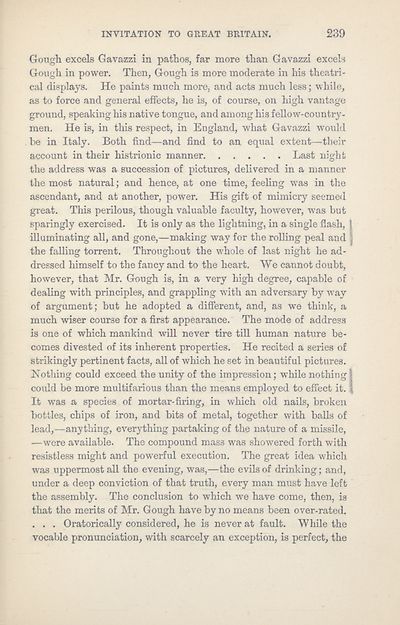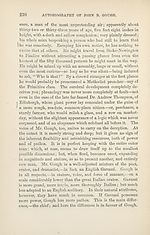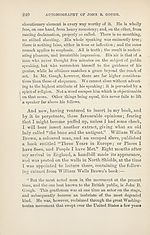Download files
Complete book:
Individual page:
Thumbnail gallery: Grid view | List view

INVITATION TO GREAT BRITAIN.
239
Gough excels Gavazzi in pathos, far more than Gavazzi excels
Gough in power. Then, Gough is more moderate in his theatri¬
cal displays. He paints much more, and acts much less; while,
as to force and general effects, he is, of course, on high vantage
ground, speaking his native tongue, and among his fellow-country¬
men. He is, in this respect, in England, what Gavazzi would
. be in Italy. Both find—and find to an equal extent—their
account in their histrionic manner Last night
the address was a succession of pictures, delivered in a manner
the most natural; and hence, at one time, feeling was in the
ascendant, and at another, power. His gift of mimicry seemed
great. This perilous, though valuable faculty, however, was but
sparingly exercised. It is only as the lightning, in a single flash, |
illuminating all, and gone,—making way for the rolling peal and |
the falling torrent. Throughout the whole of last night he ad¬
dressed himself to the fancy and to the heart. We cannot doubt,
however, that Mr. Gough is, in a very high degree, capable of
dealing with principles, and grappling with an adversary by way
of argument; but he adopted a different, and, as we think, a
much wiser course for a first appearance. The mode of address
is one of which mankind will never tire till human nature be¬
comes divested of its inherent properties. He recited a series of
strikingly pertinent facts, all of which he set in beautiful pictures.
Nothing could exceed the unity of the impression; while nothing |
could be more multifarious than the means employed to effect it. |
It was a species of mortar-firing, in which old nails, broken
bottles, chips of iron, and bits of metal, together with balls of
lead,—anything, everything partaking of the nature of a missile,
—were available. The compound mass was showered forth with
resistless might and powerful execution. The great idea which
was uppermost all the evening, was,—the evils of drinking; and,
under a deep conviction of that truth, every man must have left
the assembly. The conclusion to which we have come, then, is
that the merits of Mr. Gough have by no means been over-rated.
. . . Oratorically considered, he is never at fault. While the
vocable pronunciation, with scarcely an exception, is perfect, the
239
Gough excels Gavazzi in pathos, far more than Gavazzi excels
Gough in power. Then, Gough is more moderate in his theatri¬
cal displays. He paints much more, and acts much less; while,
as to force and general effects, he is, of course, on high vantage
ground, speaking his native tongue, and among his fellow-country¬
men. He is, in this respect, in England, what Gavazzi would
. be in Italy. Both find—and find to an equal extent—their
account in their histrionic manner Last night
the address was a succession of pictures, delivered in a manner
the most natural; and hence, at one time, feeling was in the
ascendant, and at another, power. His gift of mimicry seemed
great. This perilous, though valuable faculty, however, was but
sparingly exercised. It is only as the lightning, in a single flash, |
illuminating all, and gone,—making way for the rolling peal and |
the falling torrent. Throughout the whole of last night he ad¬
dressed himself to the fancy and to the heart. We cannot doubt,
however, that Mr. Gough is, in a very high degree, capable of
dealing with principles, and grappling with an adversary by way
of argument; but he adopted a different, and, as we think, a
much wiser course for a first appearance. The mode of address
is one of which mankind will never tire till human nature be¬
comes divested of its inherent properties. He recited a series of
strikingly pertinent facts, all of which he set in beautiful pictures.
Nothing could exceed the unity of the impression; while nothing |
could be more multifarious than the means employed to effect it. |
It was a species of mortar-firing, in which old nails, broken
bottles, chips of iron, and bits of metal, together with balls of
lead,—anything, everything partaking of the nature of a missile,
—were available. The compound mass was showered forth with
resistless might and powerful execution. The great idea which
was uppermost all the evening, was,—the evils of drinking; and,
under a deep conviction of that truth, every man must have left
the assembly. The conclusion to which we have come, then, is
that the merits of Mr. Gough have by no means been over-rated.
. . . Oratorically considered, he is never at fault. While the
vocable pronunciation, with scarcely an exception, is perfect, the
Set display mode to:
![]() Universal Viewer |
Universal Viewer | ![]() Mirador |
Large image | Transcription
Mirador |
Large image | Transcription
| Antiquarian books of Scotland > Temperance > Autobiography and personal recollections of John B. Gough > (251) |
|---|
| Permanent URL | https://digital.nls.uk/125990381 |
|---|
| Description | Thousands of printed books from the Antiquarian Books of Scotland collection which dates from 1641 to the 1980s. The collection consists of 14,800 books which were published in Scotland or have a Scottish connection, e.g. through the author, printer or owner. Subjects covered include sport, education, diseases, adventure, occupations, Jacobites, politics and religion. Among the 29 languages represented are English, Gaelic, Italian, French, Russian and Swedish. |
|---|

